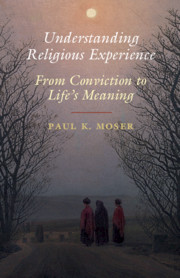
-
Select format
-
- Publisher:
- Cambridge University Press
- Publication date:
- November 2019
- December 2019
- ISBN:
- 9781108558785
- 9781108471428
- 9781108457996
- Dimensions:
- (228 x 152 mm)
- Weight & Pages:
- 0.64kg, 357 Pages
- Dimensions:
- (228 x 152 mm)
- Weight & Pages:
- 0.54kg, 357 Pages
- Subjects:
- Philosophy of Religion, Religion, Religion: General Interest
You may already have access via personal or institutional login- Subjects:
- Philosophy of Religion, Religion, Religion: General Interest
Book description
In this book, Paul K. Moser offers a new approach to religious experience and the kind of evidence it provides. Here, he explains the nature of theistic and non-theistic experience in relation to the meaning of human life and its underlying evidence, with special attention given to the perspectives of Tolstoy, Buddha, Confucius, Krishna, Moses, the apostle Paul, and Muhammad. Among the many topics explored in this timely volume are: religious experience characterized in a unifying conception; religious experience naturalized relative to science; religious experience psychologized in merely psychological phenomena; and religious experience cognized relative to potential defeaters from evil, divine hiddenness, and religious diversity. Understanding Religious Experience will benefit those interested in the nature of religion and can be used in relevant courses in religious studies, philosophy, theology, Biblical studies, and the history of religion.
Reviews
‘This book is noteworthy for its clarity of expression and systematic approach to the subject of religious experience.’
R. Ward Source: Choice
Contents
Metrics
Altmetric attention score
Full text views
Full text views help Loading metrics...
Loading metrics...
* Views captured on Cambridge Core between #date#. This data will be updated every 24 hours.
Usage data cannot currently be displayed.
Accessibility standard: Unknown
Why this information is here
This section outlines the accessibility features of this content - including support for screen readers, full keyboard navigation and high-contrast display options. This may not be relevant for you.
Accessibility Information
Accessibility compliance for the PDF of this book is currently unknown and may be updated in the future.


